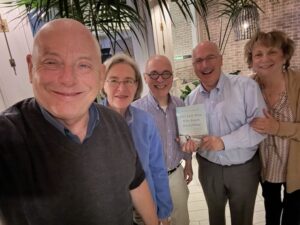 If you saw “Oppenheimer,” or know more about physics than I, you know that Enrico Fermi was the brilliant Italian physicist who’s said to have taken bets on whether the Trinity test in 1945 would ignite the atmosphere and destroy the world. My high school friend David N. Schwartz, at center into the photo, confirms it’s true. He’s the author of “The Last Man Who Knew Everything,” a highly praised 2017 Fermi biography that David wrote in part as an homage to his father, Melvin, who shared the Nobel Prize for physics in 1988.
If you saw “Oppenheimer,” or know more about physics than I, you know that Enrico Fermi was the brilliant Italian physicist who’s said to have taken bets on whether the Trinity test in 1945 would ignite the atmosphere and destroy the world. My high school friend David N. Schwartz, at center into the photo, confirms it’s true. He’s the author of “The Last Man Who Knew Everything,” a highly praised 2017 Fermi biography that David wrote in part as an homage to his father, Melvin, who shared the Nobel Prize for physics in 1988.
David and his spouse and editorial partner, Susan, were in town over the weekend so David could talk about his book to scientists at Caltech. They joined Kathy and me for dinner last night in Pasadena. We also invited Andy Tomat, volunteer treasurer of the Episcopal Diocese of Los Angeles, who majored in particle physics and was likely to speak the same language. Andy had read David’s book when it came out and brought a copy along to be autographed.
David and Susan are also co-authors of 2023’s “The Joy of Costco: A Treasurer Hunt From A To Z.” So our conversation veered from Nobel Prizes to how many times you can go to the station with free Lindor Truffles. As often as possible, the Schwartzes say. Among the other Costco experts they consulted was superfan Charlie Munger, who hosted them for a dozen interviews at his home in Hancock Park. I knew Charlie, but not as well as they, and felt inwardly warmed to learn that he and they had struck up such a meaningful friendship.
As president of the “Phillipian,” the weekly campus newspaper, David was a prince at Andover, the Massachusetts prep school we attended. He would have graduated with me in 1973 if he hadn’t skipped a year thanks to his academic brilliance. I only paid attention to Rolling Stones records and my work as reporter and editor on the paper and barely squeaked through. But David encouraged me and helped me do the best I could, notwithstanding my distracted temperament. Having reflected on my spotty academic career in my homilies at two Campbell Hall chapel services that very morning, I felt blessed to live in the particular universe where, in the evening, we came full circle a half-century later in the great particle accelerator of life and broke bread.
